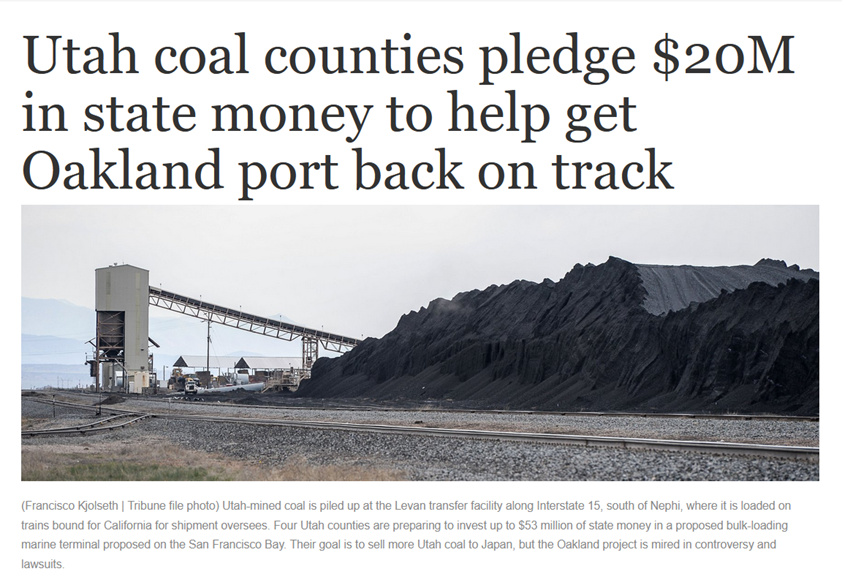Utah money laundering scheme aims to bail out bankrupt Oakland coal operators
“Utah coal counties pledge $20M in state money to help get Oakland port back on track,” an article in the Salt Lake Tribune published on Sunday July 5, 2020, exposes a money laundering scheme that has been years in the making.
A No Coal in Oakland article of March 2016 describes the Utah state government’s complicity in a shell game aimed at sidestepping initial legal challenges to attempts to squander public funding originally allocated to mitigate the effects of mining on local (Utah) communities.
The scheme, driven by elected leaders in four Utah counties in the center of the state and laid out this week by SL Tribune journalist Brian Maffly, aims to redirect millions of dollars to construction of a coal terminal in Oakland that our community is determined to block. Maffly writes:
The money in play doesn’t belong to those counties but to the people of Utah, and the counties’ request to tap the fund must clear a vetting process they have yet to initiate. The documents indicate the counties will submit an application with the Utah Community Impact Fund Board, or CIB, in the “near future” and have the money to bail out the developer by October. Six weeks after signing the pledges of support, however, the counties have yet to file the necessary application, according to Keith Heaton, the CIB’s lead staffer.
The would-be operator of the proposed Oakland coal terminal, Insight Terminal Solutions, has painted a rosy picture of the imminent arrival of Utah’s $20,000,000 bailout payment in filings associated with its ongoing bankruptcy case. But getting their hands on the money won’t be a cakewalk for the leaders of Carbon, Emery, Sevier and Sanpete counties. As Community Impact Board lead staffer Keith Heaton sees it:
“The best case is getting it before the board in August, but before that, we would have to do due diligence. We would have to have it reviewed by a financial consultant,” Heaton said. “As you know, we don’t do deep-water ports in Utah every day. The important thing is it is public funding and we take our responsibility very seriously, especially when we are talking about millions of dollars in an area we don’t have much experience with.”
The scheme to siphon millions from the people of Utah to the bankrupt, would-be coal terminal operators can still be stopped. Sunday’s article in a newspaper with the widest paid circulation in the state will help Utah activists, and residents committed to their community’s future, to oppose this cynical shell game.
If you have friends, family, or other acquaintances in Utah, please spread the news.
